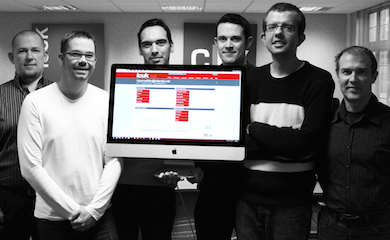 Philip Carse, Analyst at Megabuyte.com, reports on the recent performance of leading companies in the comms space during the last quarter.
Philip Carse, Analyst at Megabuyte.com, reports on the recent performance of leading companies in the comms space during the last quarter.
The UK Telecoms and Networks peer group has risen in share price terms by 7.2% over the last quarter, ahead of the 4.0% rise of the FTSE over the same period, but under-performing the Megabuyte Taylor Wessing (MBTW) 11.6% rise. Key share price performers include BT, off the back of its EE deal, and Gamma, off solid trading. Hot topics this quarter, aside from Quad Play manoeuvring by the big consumer players include hosted unified comms growth and two M&A deals for Daisy.
BT received a warm welcome for its M&A initiatives with the shares rising 17% over three months as it confirmed a £12.5bn bid for EE and raised £1bn in new equity. Sky and TalkTalk also enjoyed a good three month share performance (+10% and +8%) but the shares have under-performed over the last month, with TalkTalk talking down full year EBITDA and Sky paying 68% more per game for Premier League football (versus 18% for BT).
The best share price performers over the last year have come from the business comms community, led by Gamma's 37% rise since the October 2014 IPO, Redcentric (+31%), Adept Telecom (+24%), COLT (+17%) and Maintel (+18%). The worst share price performers have been business comms firms Coms plc and Pinnacle, down 76% and 43% respectively. Gamma issued a strong trading update, leading the company's broker to forecast £172m revenue and £22.9m EBITDA for 2014, giving growth rates of 16% and 33% respectively. The company has secured market leading growth from new services as well as growing its reseller base. CEO Bob Falconer told us, for example, that SIP trunks grew 45% and hosted voice (Cloud PBX) by 86% during 2014.
The strong growth in hosted voice is also demonstrated in results from two US-listed UCaaS pioneers, 8x8 and RingCentral. 8x8 grew revenues 26% to $41.4m and professed itself 'thrilled' with the performance of its UK subsidiary (the ex-Voicenet); while RingCentral grew 36% to $62m though, in contrast to 8x8, is still unprofitable and cash consuming. The growth in hosted Unified Comms was a key driver behind Living Bridge's recent investment in IP Solutions.
Accounts for the year to March 2014 from another Living Bridge investment - wireless ISP Metronet - confirm the very strong performance highlighted to us at the June 2014 SBO, with revenues up 49% organically to £11.6m, EBITDA up 30% and positive FCF. Contact centre and unified comms specialist Sabio delivered another year of double-digit revenue growth of 23% to £34.4m and EBITDA increased more than fourfold to £2.2m.
Three of the major players in the smaller end of the business market recently released somewhat contrasting results. Vitruvian-backed Universal Utilities/Unicom reported revenues up 3.1% to £69.1m, with the usual exemplary cash flow. The move to IFRS boosted already industry-leading EBITDA margins by a fifth, to 40%, though with a compensating increase in capex.
XLN reported a 2.1% dip in revenues to £63.8m, but EBITDA margin expansion. The company characterised the period as one of lower spending on sales and marketing, which both depressed revenues and boosted EBITDA. Chess grew revenues and EBITDA 10-11% to £48.8m and £12.2m respectively, while last June's Avenir acquisition will take revenues to over £70m in the current year.
Daisy reported that half year EBITDA fell 7.1% to £25.8m on revenues down 2.5% at £169.6m, while Azzurri reported revenues down 5.9% at £104.5m and collapsing EBITDA margins, with cash flow also impacted by yet more exceptional costs. However, the worst may be over for Azzurri following two balance sheet restructurings.
Contact centre and hosted voice provider Callstream Group (formerly Bluebell Telecom) reported revenues down 10% to £11.9m and slight margin declines, though we estimate a flat underlying performance factoring in the August 2013 sale of 3,000 customers to Adept Telecom. Accounts to March 2014 for low cost broadband provider New Call Telecom, which operates the Primus brand, showed the impact of investment by Jerome Booth in July 2013, with revenues growing 21% to £19.0m with substantial EBITDA losses. The company has also been busy on the M&A front, with an emerging markets focus, buying 75% of messaging provider Nimbuzz and 100% of wholesale voice carrier Wavecrest, though some of the reported deal valuations seems rather high to us.
The main M&A event of the last quarter was BT confirming its planned £12.5bn acquisition of EE, followed by a £1bn fund raise to help finance the deal. Away from BT, there were two deals apiece for Daisy and TalkTalk, including one between the two involving the sale of some of TalkTalk's off-net base to Daisy for an undisclosed amount. Meanwhile, TalkTalk also acquired Tesco's OTT video service Blinkbox.
Newly private Daisy also acquired the UK business of Damovo, a provider of a full range of IT services to 250 public and private sector organisations in the UK. Damovo adds about £1.5m, or 3% to Daisy EBITDA. Damovo's non-UK/European business was acquired by ex-Daisy shareholder Oakley Capital, with Daisy CEO Matt Riley becoming Executive Chairman of the business to lead a roll up.
IS Research publishes www.megabuyte.com, a company analysis and intelligence service covering over 200 public and private UK technology companies. philip.carse@megabuyte.com

 Daisy Group's incoming CEO, Neil Muller, has revealed plans to take the company on the next step in its journey towards national supremacy, and he has shown himself as a determined figure.
Daisy Group's incoming CEO, Neil Muller, has revealed plans to take the company on the next step in its journey towards national supremacy, and he has shown himself as a determined figure. By Elvire Gosnold, Director, Blabbermouth Marketing: I want a modern, professional, clean website. This is what many of our clients want in their new website but everyone has a different opinion of what is modern and attractive.
By Elvire Gosnold, Director, Blabbermouth Marketing: I want a modern, professional, clean website. This is what many of our clients want in their new website but everyone has a different opinion of what is modern and attractive. Simwood has ‘grown-up' says Managing Director Simon Woodhead who lets us know what the company stands for as a channel champion in the making.
Simwood has ‘grown-up' says Managing Director Simon Woodhead who lets us know what the company stands for as a channel champion in the making. Government plans to crack down on nuisance callers do not go far enough according to Simwood's MD Simon Woodhead (pictured).
Government plans to crack down on nuisance callers do not go far enough according to Simwood's MD Simon Woodhead (pictured). The ICUK team have taken a bow after the successful roll out of Version 12 of the company's control panel for reseller partners.
The ICUK team have taken a bow after the successful roll out of Version 12 of the company's control panel for reseller partners. Falling prices and consumers' insatiable desire for multimedia content mean that the phablet phenomenon will continue into 2015 and beyond.
Falling prices and consumers' insatiable desire for multimedia content mean that the phablet phenomenon will continue into 2015 and beyond.